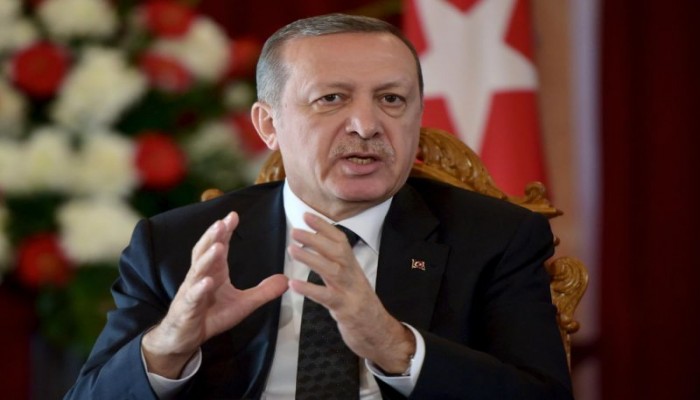President Erdogan raking up Kashmir issue to nurture his caliphate ambitions: Part-1
- In Military & Strategic Affairs
- 10:04 PM, Feb 21, 2020
- Ramaharitha Pusarla
Ending prolonged status quo, India abrogated the autonomy of state of Jammu and Kashmir. Frustrated Pakistan, made every attempt to internationalise the issue. Buttressing Pakistan’s efforts, Turkish President Erdogan raised the issue at UNGA. Expressing regret over Erdogan’s remarks at UNGA, MEA asserted, “We call upon the Turkey government to get a proper understanding of the situation on the ground before they make any further statements on this issue. It is a matter which is completely internal to India”. Notwithstanding India’s stern response, last week in a joint declaration, Erdogan approved Pakistan’s stand on Kashmir and expressed complete solidarity to Islamabad. India took strong objection to “all references to Jammu and Kashmir” and urged Turkey to “not interfere”. In the light of Turkish President’s relentless anti-India postulations, it is imperative to explore the steadfastness of Pakistan and Turkey bilateral ties.
This article is the first part of the two-article series which attempts to analyse the burgeoning Turkey-Pakistan strategic partnership and its implications.
Part-I
Kashmir has been Pakistan’s jugular. As the first Muslim nation in the post-colonial era, Pakistan demanded support of Muslim Community (ummah) and used OIC (Organisation of Islamic Cooperation), the second largest intergovernmental organisation after UN to relentlessly pursue Kashmir issue. Bound to uphold Muslim interests, OIC responded to Pakistan’s Kashmir dynamic. It constituted a Contact Group on Kashmir comprising Saudi Arabia, Turkey, Azerbaijan, Niger and Pakistan in 1994 which supported self-determination of Kashmiris and offered to mediate difference between India and Pakistan. In 2009, OIC appointed a Special Representative to Kashmir. Dissatisfied with these steps, Pakistan demanded restrictions on employing Indian citizens in Arab countries and trade sanctions as well.
Islamabad stifled India’s entry into OIC despite having third largest Muslim population after Indonesia and Pakistan. Not discouraged by Pakistan’s insidious plans, India cultivated ties with diverse Muslim countries. With time, fissures developed in OIC. Much to the disappointment of Pakistan which anticipated a strong backing from the OIC in the aftermath of abrogation of Article 370, UAE deemed the legislation as India’s internal issue. Baring Turkey, Malaysia, China and Pakistan no other country raised K-issue at the 2019 UNGA summit. Speaking at the UNGA Erdogan said, “Despite the resolutions, India-Occupied Kashmir is still besieged and eight million people are stuck in Kashmir” lending credence to Pakistan’s false propaganda.
Erdogan’s statements brought to the fore the salience of new surge in Pakistan-Turkistan engagement. After the first World War, Turkey emerged as the only independent Muslim nation. Against all odds, formidable Indian Muslims support vindicated Turkey’s sovereignty regarded as the only Islamic Caliphate. Ali brothers took on the British for Turkey and Indian Muslim Fund offered 125,000 pounds, later used in construction of Turkish Parliament at Ankara and first Nationalist Bank. The Khilafat agitation of 1919 exemplified India’s support to former Ottoman Empire. Founder of Pakistan, Mohammed Ali Jinnah had a special fascination towards Mustafa Kemal Ataturk and envisioned to develop Pakistan along the modern framework of Kemalism.
After partition, Pakistan established diplomatic ties with Turkey and signed eternal friendship agreement in 1954. It affirmed wide range of cooperation over international matters of mutual interest, defence, manufacture and production of arms and ammunition and support in an event of unprovoked attack from outside. Pakistan’s west-ward tilt can be attributed to Turkey, a part of the Western League and shared West’s fears of a Southward invasion by the Soviet forces. Consequently, Pakistan has been part of the Baghdad pact comprising of UK, Turkey, Iran and Iraq which eventually transformed into CENTO (minus Iraq). Pakistani President Iskandar Mirza signed a communique in 1956 stating that Turkey will standby Pakistan to resolve disputes with India while Pakistan will support Turkey over Cyprus issue.
This entente intensified in the subsequent years. Turkey, Pakistan and Iran developed an alliance, Regional Cooperation for Development (RCD). During Pakistan’s wars with India, RCD firmly stood behind it and Turkey delivered $5 million worth arms and ammunition. After Pakistan officially recognised Bangladesh in 1974 Turkey and Iran extended similar courtesy. The recently concluded mini Muslim coalition at Kuala Lumpur can trace its origins to a coalition envisaged by Turkish President Celal Bayar who mulled a Muslim grouping comprising of Afghanistan, Pakistan and Iran. But Afghanistan being neutral refused to join. Pakistan, Turkey and Iran went ahead and laid foundation for united communication network between the countries funded by the US.
Extending commensurate support and defending Turkey’s invasion of Cyprus in 1974 at the UN, Islamabad supported Turkey. West condemned Turkey’s conquest over North Cyprus and objected its aggressive action. Turkey’s refusal to allow US to airlift supplies to Israel during the 1973 Middle East war created a crisis of confidence with Western allies. Istanbul’s ties with the West strained. West’s alienation brought about a marked change in Turkey’s foreign policy. Despite historical grudge Turkey cozied up to Arab World and became regular participant of OIC since 1981. Let down by Western allies, Pakistan and Turkey joined NAM (Non-Allied Movement). Russian invasion of Afghanistan and revolution in Iran which marked a drastic shift in geopolitics led to crumbling of CENTO and eventually RCD. Iran moved out. While warmth of Iran-Pakistan ties with Iran is still questionable, bilateral ties between Turkey and Pakistan relation thrived on ideological commonality and mutual admiration in part.
There is significant solidarity between both nations over several issues. Turkey is particularly close to Azerbaijan, which sparred with Republic of Artkash supported by Armenia. Armenia has no diplomatic ties with Azerbaijan and Turkey. Pakistan is the only country who doesn’t recognise Armenia which suffered a genocide at the hands of Turkey. Soon Pakistan, Turkey and Azerbaijan developed into an axis. By implication this axis backs Pakistan on Kashmir at the UN while Armenia continues to side with India.
There are areas of notable geopolitical differences-Pakistan attaches immense importance to her ties with Arab World, Turkey harbours different ambitions. Similarly, Turkey engages with Israel to stabilise its position in the Middle East dominated by Arabs. Ironically, Turkey objected to Israel’s 1967 war but maintained diplomatic ties with Jerusalem. As of now Pakistan evades any official interaction with Israel. Likewise, Turkey supported the North Alliance comprising of Tajiks and Uzbeks. Turks and Uzbeks share common heritage. While Pakistan was on the opposite side. Even now the Uzbek Taliban seek refuge in Turkey. One of the two vice-Presidents of Afghanistan, Abdul Rashid Dostum is openly hostile towards Pakistan.
Under President Erdogan, despite the divergences on geopolitical front, steered by the larger goal of heading a Sunni World and driven by vision 2023, Turkey is renewing ties with Pakistan. Till the elevation of Erdogan, Turkey was fraught with perennial military coups. With an impressive economic resurrection during his first tenure, Erdogan earned the trust of the people. Slowly, he began to supplant the administration with his agenda of establishing a Caliphate. Erdogan has been unequivocal about his grand vision 2023 for Turkey which marks the one hundredth anniversary of establishment of Turkish Republic. This included creation of new identity, making Turkey a global actor and journey into an imagined future reconstructing a collective grandiose Turkish identity. In no uncertain terms, faithful followers of Erdogan began to imagine him a “Caliph”. Truly, his rise to power in 2002 and his envious consolidation of authority, extricating the military tutelage, weakening of other organs of democracy like legislature, executive and judiciary had all the hallmarks of rise of powerful autocrat. The Turkish Republic envisioned by architect of the nation Kamal Ataturk suffered a gradual melt down. Instead of promising more freedom and liberty to the civil society the narcissistic rise of Erdogan resulted in purging of enemies and censorship of liberties, freedom of expression and press that became more apparent since the failed coup in 2016. His re-election and continual harping on the collective trauma of the fall of the Ottoman Empire and its periodically invocation created a zealous nationalism.
Religiously following this very paradigm, Erdogan snatched victory in 2018 despite public consternation. Ever since Erdogan has been sailing in deep and murky waters to unapologetically realise his vision of establishing an Islamic Caliphate. Among the grand visions of Erdogan included a dictum of appointing advisers from all Muslim regions from the supposed Caliphate. Clearly the writing has been on the wall. Suat Onal, member of governing council of AKP (Justice and Development Party) posted on Facebook, “Erdogan will become the caliph in 2023 and Allah will shed his light on him”. Not only staunch political Islamists, several sections of people including academicians endorsed Erdogan’s postulations, interference in Syria, Iran, Libya and absolved him of humongous levels of corruption.
Contd.....







Comments